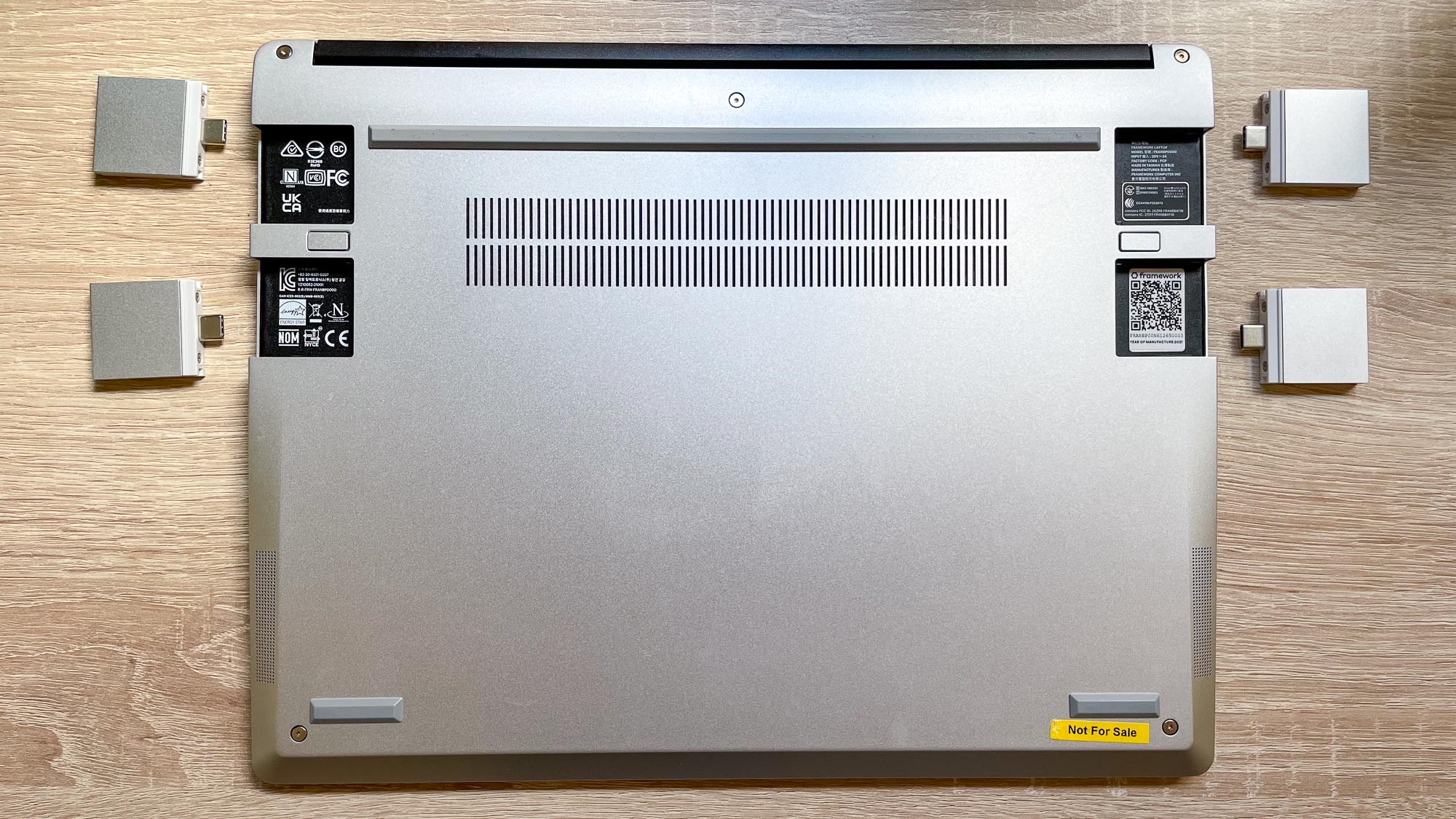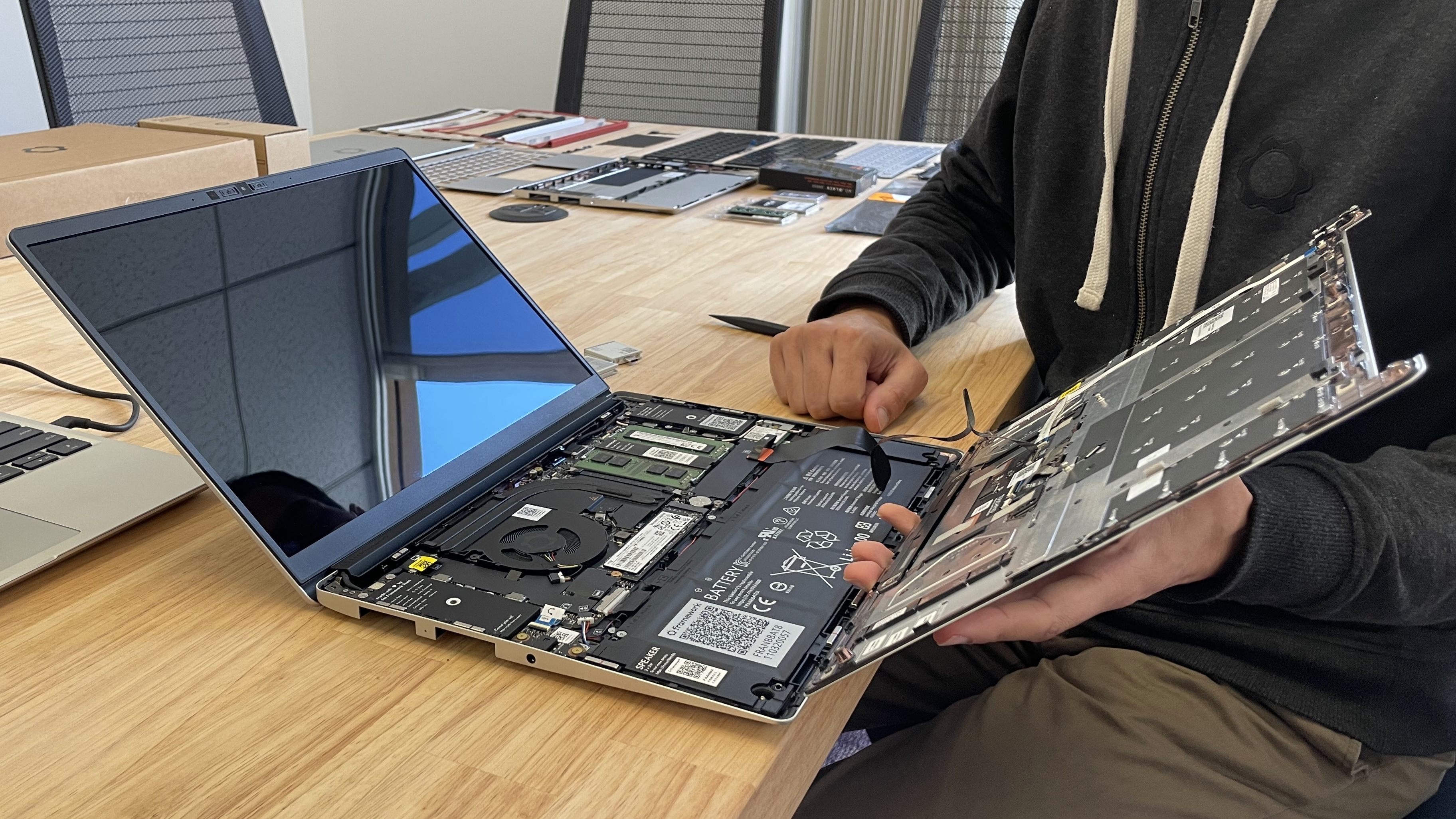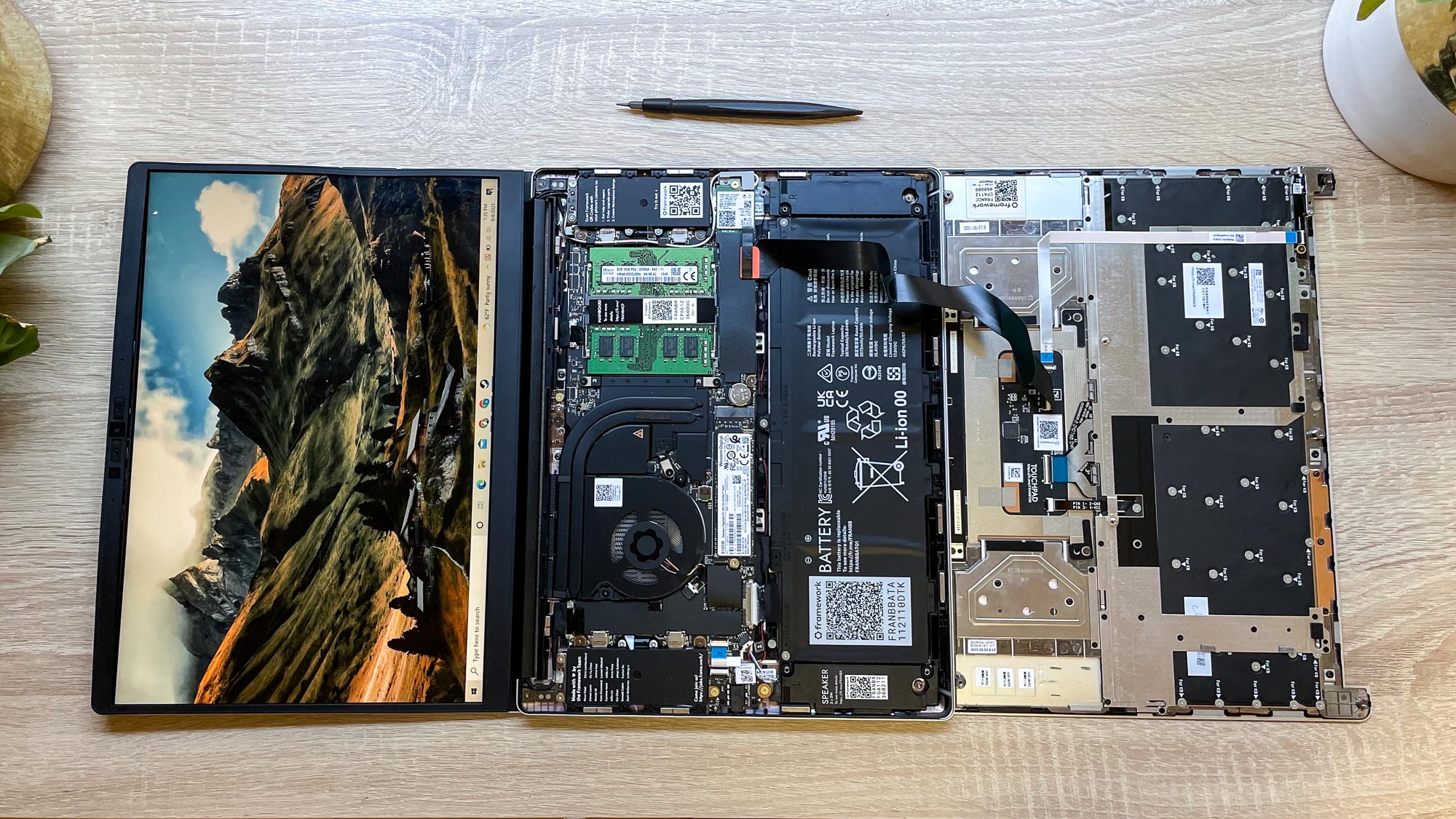The Framework Laptop is the future of laptops — and that’s why I’m buying one
Every laptop maker should copy what Framework is doing

It’s time for a new laptop. My faithful Dell XPS 13 is over five years old, and it’s starting to struggle with plain ol’ Windows 10 — forget about Windows 11.
It’s an exciting time to upgrade, too, because the laptop market has come a long way over the last five years and there’s some incredibly light and powerful machines out there: the Asus Zenbook 13 OLED, the Samsung Galaxy Book Pro 360, and of course the Dell XPS 13 OLED. All have gorgeous OLED screens, comfy keyboards, and more than enough power for my needs. Plus, they can all be had without breaking my budget.
So why have I had the Framework Laptop order page open in a tab for a week now? Why is my finger regularly hovering over the buy button on a laptop I’d have to assemble myself? One that doesn’t even come with a slick OLED display?
- Windows 11 could be way faster than Windows 10 — here's how
- Microsoft Surface Pro 8 — here are 5 upgrades it needs to have
- Plus: Intel’s first Alchemist graphics card could battle Nvidia GeForce RTX 3070
I think it’s the community. Well, that and the Framework’s incredibly accessible design, replete with its innovative expansion card system that lets you swap out ports on a whim. I can’t tell you how many times I’ve tried to plug one of my trusty old USB-A accessories into a new laptop I’m reviewing, only to be stopped cold at the sight of a few USB-C ports and a headphone jack.
With a Framework, I could slot in whatever four ports I need for the day from the catalog of expansion cards I can buy, which includes such clutch players as the microSD card reader I’ll need to get photos off that old digital camera in my closet and the HDMI port I’ll want when the holidays roll around and I’m trying to introduce my family to those despecialized Star Wars cuts.
There are also 250GB and 1TB storage expansion cards, too, in case I need some extra space. And the best part is that Framework has released design docs and reference specs for the expansion card system under an open-source license, which means some enterprising fans have already designed custom expansion cards like an RFID reader or — perhaps most exciting — a snack drawer.
So yeah, it’s the passion and ingenuity of the Framework community that keeps pushing me to take the plunge and purchase one of my own. I was intrigued by the potential of the Framework when I first saw a pre-release version in a nondescript office building in Burlingame early this year.
Get instant access to breaking news, the hottest reviews, great deals and helpful tips.
The pitch of a more repairable and upgradable ultraportable was too good to pass up, and when I saw the laptop in person I was amazed at how thin and light it was. After all, so many laptop manufacturers (*cough* Apple *cough*) justify shipping laptops with irreplaceable components by saying they’re easier and more cost-effective to produce, with thinner, lighter frames than could be delivered if everything inside was accessible.
Yet there I was in that deserted (thanks COVID!) office building holding a laptop that was as thin and light as the latest MacBook Pro M1, yet more accessible and idiot-proof than my car.
And let me tell you, as someone who’s accidentally tried to pour motor oil into the washer fluid reservoir more than once: my car’s pretty idiot-proof!
When I asked Framework founder Nirav Patel how much thinner and lighter the Framework laptop could have been if they hadn’t designed so many of the components to be replaceable, his answer surprised me: not very.
"It's amazing how little you lose," Patel told me. "Technically we could have shaved off like a fraction of a millimeter if we soldered down the RAM, or if we didn't build in our expansion card system...[but] it's that much more shameful that like, you actually don't have to trade off that much."
Framework delivers on its promise
I left that meeting feeling surprised and excited about the promise of the Framework, but also dubious the company could deliver on it without some glaring sacrifices. Fast forward to this summer, when we got one in for review, and after spending a few weeks using a Framework I became convinced the company delivered the goods as promised.
I tested one of the $1,399 Performance configurations, and I was impressed by (among other things) the sizable screen, comfy keyboard and solid battery life. Sure, the Framework can’t match the performance of some similarly-sized and -priced laptops, but I don’t need a laptop to do a ton of gaming or video editing — I have a desktop for that. What I need is a portable, comfortable laptop that delivers good enough speed and lasts at least 8 hours on a single charge, which the Framework is more than capable of.
And even if the performance of our review unit wasn’t outstanding, I feel like I don’t have to worry so much about being left behind once my new laptop starts to lose its luster. If I buy a Framework and find it struggling a bit too much a few years down the road, shucks, all I have to do is head over to Framework’s website and buy some more RAM, or a beefier CPU to swap in.
Heck, maybe one day there might even be an external GPU enclosure I can buy that hooks up through an expansion card and gives me enough power to play even the latest games on my aging ultraportable.
A laptop built to outlast its creators
But wait, I hear some of you say: what happens if Framework stops supporting its laptops? What if the company runs into trouble and shuts down, cutting off easy access to replacement parts and upgrades? What then, you right-to-repair hipster? Where will you and your funky DIY laptop be?
This is a reasonable concern, one I floated in my own review of the Framework. But after taking some time to reflect on it, I think it’s less reasonable than I first believed. See, we’re focusing too much on whether Framework will stay in business for as long as we’re using the company’s laptops, when the big selling point of said laptops is that they’re designed to be upgradable and replaceable even if the company goes out of business. Sure, it’s nice that Framework will be selling parts for its devices, offering repair services, and supporting a community of hardware partners and enthusiasts. But even if that all went away in a year, we can still expect Framework laptops to be more accessible and repairable than basically any other laptop on the market.
For example, Framework has already committed to making its schematics and assembly drawings available to repair shops who request them. That means if the company takes a nosedive next year, you’d probably still be able to find someone to repair your laptop when it breaks. And since the company has already published documentation, CAD templates and reference designs for expansion cards under an open-source license as part of its Expansion Card Developer Program, it’s reasonable to expect they might release similar open-source resources for all the replaceable components down the road.
All in all, the Framework laptop is already better positioned to outlast its creators than anything the competition makes, and it’s attracting a community of DIY types who are already coming up with cool new ideas for ways to modify or expand the laptop’s functionality.
It’s that community that keeps drawing me back to the Framework website. Ostensibly I go back just to check out the community discussion board and see what funky ideas people are coming up with for new expansion cards -- personally, I’m hoping someone comes up with a cool design for that afore-mentioned GPU enclosure. But every time I go back I find myself gravitating towards the order page, configuring myself a nice Core i7-powered build-it-yourself Framework with extra storage and plenty of expansion cards. I haven’t conquered my indecision enough to actually order it yet, but by the time you read this I’ll probably have one heading my way.
Of course, with the current order backlog I probably wouldn’t get my new Framework until November. But it’s worth it for the opportunity to finally own a laptop that feels like it was designed to help me get the most out of it, rather than to treat me like I’m an untrustworthy idiot who can’t manage to swap out his own RAM without breaking something.
And look, I am an untrustworthy idiot most of the time, and I have nearly snapped more than my fair share of RAM sticks during the upgrade process (the dubious boast of a benighted tech journalist) — but Framework doesn’t need to know that. It certainly doesn’t treat me like that. So far the company has treated me and its customers with a level of respect that puts other laptop vendors to shame.
That strategy seems to be paying off, based on the order backlog for Framework laptops and the active community which has quickly sprung up around them. I know a laptop you can crack open and repair yourself might seem like a niche product, one too daunting for most folks to bother with, but Framework’s published guides and clearly labelled components (complete with QR codes for each that take you to a store page to purchase replacements) do a lot to make replacing the battery or upgrading the CPU seem approachable. All in all, it’s a remarkable achievement, one I hope gets scrutinized and copied by every other laptop maker on the market.
Next: Read about how my colleague built a Framework laptop himself and it lived up to the hype.

Alex Wawro is a lifelong tech and games enthusiast with more than a decade of experience covering both for outlets like Game Developer, Black Hat, and PC World magazine. A lifelong PC builder, he currently serves as a senior editor at Tom's Guide covering all things computing, from laptops and desktops to keyboards and mice.
 Club Benefits
Club Benefits










